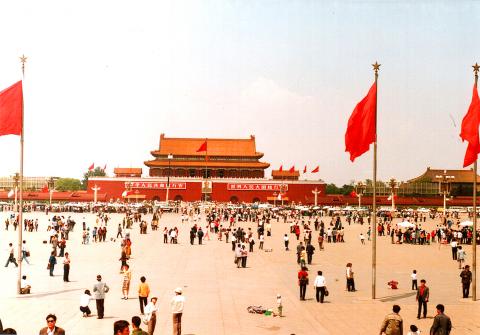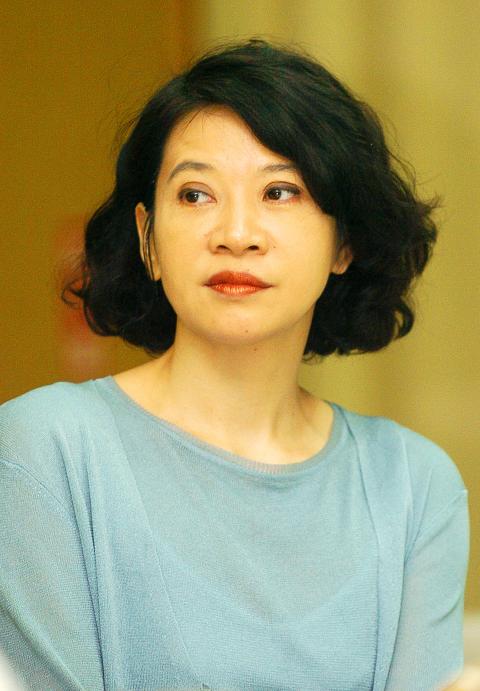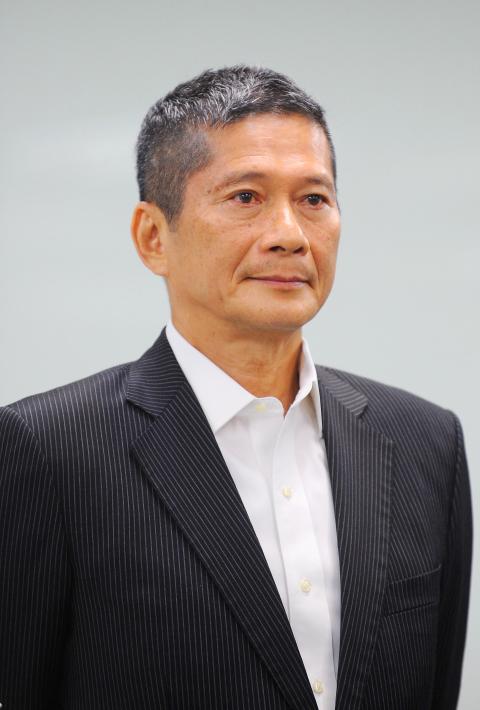Sept. 12 to Sept. 18
Before Independence Evening Post (自立晚報) reporters Lee Yung-teh (李永得) and Hsu Lu (徐璐) set out on their historic journey as the first Taiwanese reporters to visit China on Sept. 14, 1987, they reportedly requested that they not be hosted by government officials, they would pay their own way and they would be able to report freely.
However, during the press conference upon arrival at Beijing’s airport, a Reuters reporter asked them, “Do you really believe that you will be able to report freely in China?” Lee and Hsu then asked for his opinion. “I cannot tell you,” he replied, and the crowd of foreign reporters erupted in laughter.

Photo courtesy of Wikimedia Commons
Lee and Hsu write in their book, Historic Journey to the Mainland (歷史性 大陸行) that they had already noticed that they were being followed on their first day in Beijing. When the duo questioned their hosts, China News Service, about the situation, they were told that it was for their safety, as there were “some people who did not approve of their visit.”
Even when Lee and Hsu were able to score an interview on their own, the source insisted that they bring their hosts along. In other situations, the hosts would also insist on arranging all the transportation and accompany them for “safety” issues. A foreign reporter told them that sometimes he would have to run as fast as he could to buy a few precious minutes to speak to passersby without supervision.
Phone calls to their hotel were also “filtered” by the operator, who turned away people who wanted to privately contact them without official notice. Those who finally got through told them about all the political hurdles they had to pass to get in touch with them.

Photo: Wang Min-wei, Taipei Times
“To be frank, all our requests while we were in China were respected on the surface … but we were surrounded by an invisible net and only felt increasing pressure,” Lee and Hsu write. They cite a Taiwanese who once said that upon finally achieving his dream of visiting the “motherland,” he only felt unfamiliarity and fear.
“In those 13 days we reported in China, in the bottom of our hearts were exactly this indescribable ‘unfamiliarity and fear,’” they write.
A DARING PLAN

Photo: Liu Hsin-teh, Taipei Times
Frank Wu (吳豐山), then-president of the paper, details his decision to send reporters to China in the introduction of Lee and Hsu’s book.
“On this planet, Taiwan and China are the closest to each other, but also the furthest because of political issues,” he writes. “This is not beneficial to Taiwan’s long-term future. Reporters from other countries have visited China — but the viewpoint of a foreigner or even a Chinese living overseas would be totally different from ours, and would not serve as a useful reference.”
There had been talks of allowing Taiwanese to visit their relatives in China since March 1987, and by September the general guidelines were set, prompting Wu to set his plan into motion.
Wu informed editor-in-chief Chen Kuo-hsiang (陳國祥), and they decided to send Lee and Hsu. Wu also decided not to inform the publisher or chairman until the two left the country. Lee and Hsu flew to Japan first on Sept. 11, upon which Wu made a public announcement.
“While waiting for their flight, the three of us had lunch at the airport,” Wu writes. “The two were calm and collected, with frequent mentions of ‘we are writing history.’”
The government ordered the newspaper to recall the reporters, but Chen refused, stating that it would not only look bad for the newspaper, but also make the government look bad in trying to suppress freedom of the press. By this time, martial law had been lifted for four months.
On Sept. 14, Wu met with then-head of the Government Information Office Shao Yu-ming (邵玉銘), telling him, “Since the government has allowed visitation of relatives in China, as the press, it is our duty to serve as a vanguard for our readers,” and reiterated that he would not recall the reporters.
That same day, Lee and Hsu received their Chinese visas and boarded a flight from Tokyo to Beijing. Wu recalls receiving as much supportive letters as ones denouncing the paper.
A CURSORY LOOK
Lee and Hsu write that one main takeaway from the trip was how “fossilized” the government anti-Communist propaganda in Taiwan was.
“Regarding the general standard of living, China is indeed behind us, but we cannot ignore their attempts to reform. The Chinese Communist Party may have terrorized its population with the Gang of Four incident and the Cultural Revolution, but it has regained their trust through economic reforms,” they write.
They spent time in Beijing, visited West Lake in Hangzhou and also stopped by Guangzhou and Xiamen, detailing their observations. They were able to interview Fang Lizhi (方勵之), a political dissident whose ideas inspired the 1987 pro-democracy student movement.
Lee and Hsu write in the book’s introduction that from a journalistic standpoint, they were not happy about the trip as they were only offered a cursory look of a land that had been closed off to them for so long.
“But it is a real documentation completely through the eyes of Taiwanese reporters and not filtered through the perspective of a foreigner,” they add. They conclude by stating that they hope for more mutual understanding and that both sides stop using political propaganda to defame and uglify each other.
Upon Lee and Hsu’s return on Sept. 27, the government banned the Independence Evening News from sending any reporters overseas for two years and also arrested Wu, Lee and Hsu for forgery of public documents, claiming that they had applied to visit Japan but went on to China.
After a lengthy court case, the defendants were acquitted — perhaps an indication that times were changing.
Taiwan in Time, a column about Taiwan’s history that is published every Sunday, spotlights important or interesting events around the nation that have anniversaries this week.

On April 26, The Lancet published a letter from two doctors at Taichung-based China Medical University Hospital (CMUH) warning that “Taiwan’s Health Care System is on the Brink of Collapse.” The authors said that “Years of policy inaction and mismanagement of resources have led to the National Health Insurance system operating under unsustainable conditions.” The pushback was immediate. Errors in the paper were quickly identified and publicized, to discredit the authors (the hospital apologized). CNA reported that CMUH said the letter described Taiwan in 2021 as having 62 nurses per 10,000 people, when the correct number was 78 nurses per 10,000

As we live longer, our risk of cognitive impairment is increasing. How can we delay the onset of symptoms? Do we have to give up every indulgence or can small changes make a difference? We asked neurologists for tips on how to keep our brains healthy for life. TAKE CARE OF YOUR HEALTH “All of the sensible things that apply to bodily health apply to brain health,” says Suzanne O’Sullivan, a consultant in neurology at the National Hospital for Neurology and Neurosurgery in London, and the author of The Age of Diagnosis. “When you’re 20, you can get away with absolute

May 5 to May 11 What started out as friction between Taiwanese students at Taichung First High School and a Japanese head cook escalated dramatically over the first two weeks of May 1927. It began on April 30 when the cook’s wife knew that lotus starch used in that night’s dinner had rat feces in it, but failed to inform staff until the meal was already prepared. The students believed that her silence was intentional, and filed a complaint. The school’s Japanese administrators sided with the cook’s family, dismissing the students as troublemakers and clamping down on their freedoms — with

As Donald Trump’s executive order in March led to the shuttering of Voice of America (VOA) — the global broadcaster whose roots date back to the fight against Nazi propaganda — he quickly attracted support from figures not used to aligning themselves with any US administration. Trump had ordered the US Agency for Global Media, the federal agency that funds VOA and other groups promoting independent journalism overseas, to be “eliminated to the maximum extent consistent with applicable law.” The decision suddenly halted programming in 49 languages to more than 425 million people. In Moscow, Margarita Simonyan, the hardline editor-in-chief of the